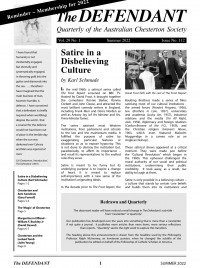
In the mid-1960s a satirical series called The Frost Report screened on BBC TV. Hosted by David Frost, it brought together the comedians Ronnie Barker, Ronnie Corbett and John Cleese, and attracted the most brilliant comedy writers in England, including Frank Muir and Denis Norden as well as Antony Jay (of Yes Minister and Yes, Prime Minister fame).
The series satirised most Western institutions, from parliament and schools to the law and the mainstream media. It fulfilled the purpose of satire by exaggerating particular features or situations so as to expose hypocrisy. This is not done to destroy the institution but, paradoxically, to affirm its importance – and recall its representatives to the exalted roles they serve.
Satire is meant to be funny but its underlying purpose is to inspire a change of heart. It is meant to replace self-importance with a new sense of the institution’s originating ideals.
In the decade prior to The Frost Report, the Boulting Brothers made a series of films satirising most of our cultural institutions – the armed forces (Private’s Progress, 1956), law (Brothers in Law, 1957), universities and academia (Lucky Jim, 1957), industrial relations and the media (I’m All Right, Jack, 1959), diplomacy and foreign relations (Carlton-Browne of the F.O., 1959), and the Christian religion (Heaven’s Above, 1963, which even featured Malcolm Muggeridge in a cameo role as an Anglican bishop).
These satirical shows appeared at a critical moment. They were made just before the “Cultural Revolution” which began in the 1960s. This upheaval challenged the moral authority of our social and political institutions, undermining their public credibility. It took away, as a result, our ability to laugh at them.
Satire is only possible in a believing culture – a culture that stands by certain core beliefs and builds them into its institutions and practices. Only when they are taken seriously can they be funny.
Human flaws and frailities will always expose the gulf between belief and reality, between the light of our higher dignity and the darkness of our fallen condition. But in this contrast lie the precious seeds of satire.
Balance of exaltation and humility
As Chesterton recognised, the Christian faith balances exaltation and humility. It asserts our being divinely dignified by being made in the image and likeness of God, but also our being humbled by the weakness of sin and the chronic misuse of freedom. As Chesterton put it:
“In so far as I am Man I am the chief of creatures. In so far as I am a man I am the chief of sinners.” (“The Paradoxes of Christianity,” Orthodoxy, 1908)
When a culture abandons its fundamental beliefs, and can no longer profess their essential truth and value, it becomes incapable of producing satire. There is no longer a rich contrast between what it believes and what it does. Is there anything left to mock – except cynically – and to find funny?
The result of a loss of belief, as our culture now exhibits, is that we are losing the capacity to laugh at ourselves. As Ronald Knox feared, even a century ago, when writing about the decline of satire, we “have lost, or are losing, the power to take ridicule seriously.” (Essays in Satire, 1928)
A century ago, Chesterton foresaw the link between the credibility of a culture and the capacity for satire. He found that satire was already weakening in Western culture – that “the world has become too absurd to be satirised. . . . . There must be a certain dignity in the subject of a caricature; with us the facts anticipate the caricaturists.” Actual events had become so ridiculous that they were already a caricature. In Chesterton’s words:
“You can make solemn things look silly; that is the whole affair of satire. But if things choose to be silly, and nothing else but silly, the only answer is silence. It is impossible to caricature that which caricatures itself.” (Illustrated London News, December 16, 1911).
And yet Chesterton himself employed satire to great effect at times. He once conceived of an interview with H.G. Wells who, in his Outline of History (1920), showed a naïve belief in evolution as supplanting faith in the Bible.
Chesterton’s imaginary interview began by recording “the recently discovered traces of an actual historical Flood: a discovery which has shaken the Christian world to its foundations by its apparent agreement with the Book of Genesis. . . . Mr H.G. Wells exclaimed: ‘I am interested in the Flood of the future, not in any of these little local floods
that may have taken place in the past. I want a broader, larger, more complete and co-ordinated sort of flood: a Flood that will really cover the whole ground. . . . Après moi le Déluge. Belloc in his boorish boozy way may question my knowledge of French: but I fancy that quotation will settle him.” (Maisie Ward, Gilbert Keith Chesterton, 1944)
Facebook confusion
Kyle Mann, editor-in-chief of a Christian news satire service, Babylon Bee, quoted Chesterton’s thoughts on satire when he found them borne out in a recent experience with Facebook (Wall Street Journal, October 21, 2021). He had posted a blog containing a satirical headline from Monty Python and the Holy Grail (1975) about a witch, and a reference to the Pythonesque line, “We must burn her.”
Facebook misconstrued the reference. Based on the prompts of their computer alert system, they saw it, not as a satirical reference to a well-known comedy film, but as “inciting violence”. Mann believes this represents a new threat to satire on the part of the social media giants. Facebook has no sense of humour and cannot tell the difference “between comedy and a threat of violence.”
Such confusion may stem from the hidden truth about satire, and that is its fundamentally moral purpose and power. As Ronald Knox pointed out, satire is not a toy of relaxation but a weapon of discomfort – and correction. It is “entrusted to us for exposing the shams and hypocrisies of the world.” It is “born to scourge the persistent and ever-recurrent follies of the human creature as such,” and thus applies to the satirist, and not merely his readers or listeners.
The Beneficent poison of satire
Little wonder that satire does not appeal to those who prefer to signal virtue rather than practise it. It brings all too close the need for self-examination – and self- correction. The most striking feature of the “woke culture” is its loss of humour.
Knox recognised what he called “the disciplinary effect of satire” – or, more colourfully, “the beneficent poison of satire” – which has been replaced by the more benign diversions of humour.
Humour is, of course, an intrinsic and irresistible part of satire, but the silent purpose is remedial – and even redeeming. It is to produce a sharp re-awareness, and a change of behaviour. As Chesterton’s great friend and protagonist, George Bernard Shaw, is reputed to have said:
“If you want to tell people the truth, you’d better make them laugh or they’ll kill you.”
